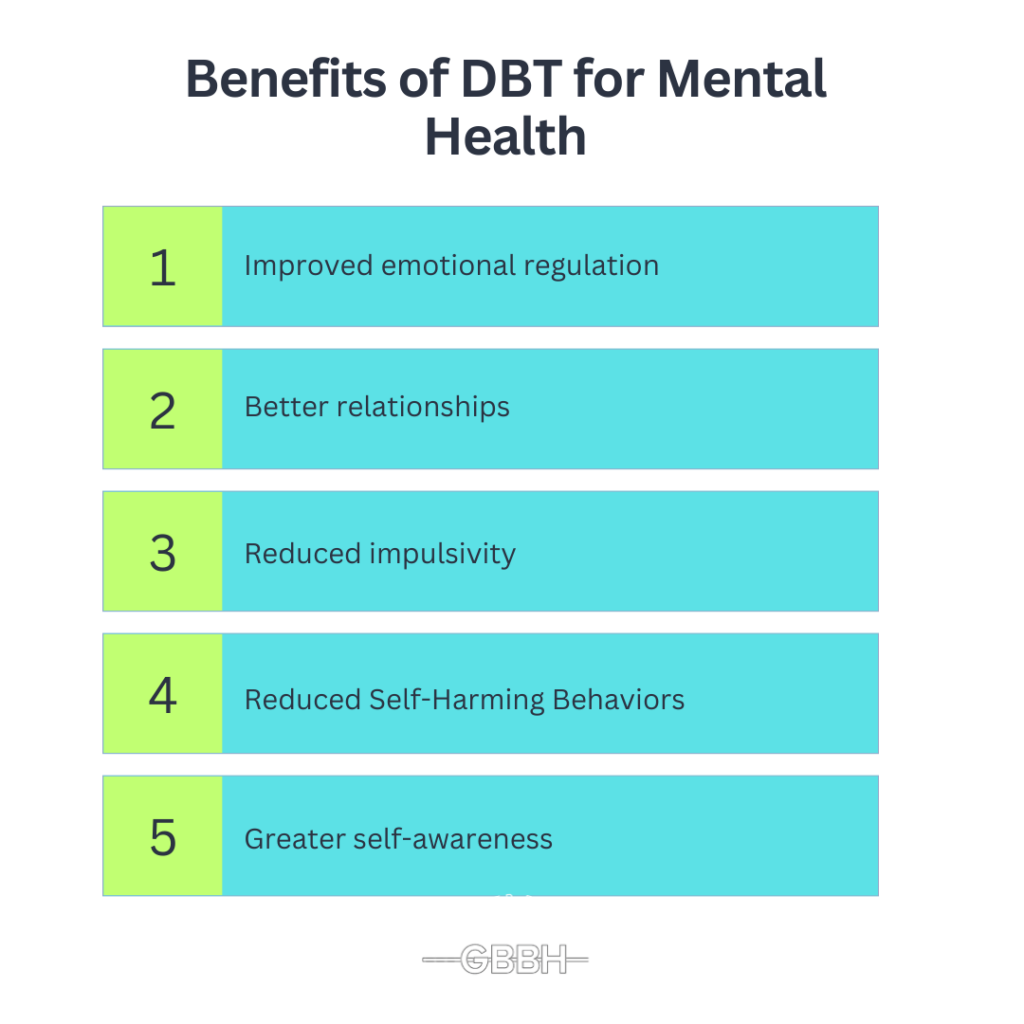In modern society, stress and other mental disorders have become rampant, so it is therefore important for victims to get the appropriate treatment. Thus, Dialectical Behavior Therapy or DBT has become some sort of weapon against these issues. In this way, it does not seem to matter where a person is – located in Massachusetts or another region – as DBT remains a methodical and successful approach to focusing on a person’s psychiatric treatment.
What Is Dialectical Behavior Therapy (DBT)?
DBT stands for dialectical behavioral therapy, cognitive behavioral treatment approach developed for the treatment of emotional dysregulation and self-destructive behavior. Designed in the late 1980s by Dr. Marsha Linehan as therapy for Borderline Personality Disorder it has now become a helpful tool to cope with a range of mental disorders such as anxiety, depression or PTSD.
This is what makes DBT to differ from other therapies because while it uses cognitive behavioral techniques it also includes mindfulness. Above, DBT has been seen to be different from other medicines because while it incorporates cognitive behavior it also vexes mindfulness. This combination makes patients increase their recognition of thoughts, feelings, and behaviors and accept themselves and the situations that they find themselves in.
Why Choose DBT?
Mindfulness: This module makes people approach the present and encourages them to accept themselves and their situation.
Distress Tolerance: Few realize how when the hardships are faced, it is almost difficult to contain difficult feelings. These moments are made bearable by this skill set so that the patients do not react destructively.
Emotion Regulation: DBT helps people to learn how to recognize and understand feelings the right way and then manage them correctly.
Core Components of DBT
DBT consists of four main components that work together to promote healing and personal growth:
- Mindfulness: This foundational skill involves being present in the moment without judgment. Mindfulness helps individuals become aware of their thoughts and feelings, allowing them to respond more effectively to emotional triggers.
- Distress Tolerance: This skill focuses on building resilience during crisis situations. Individuals learn to tolerate painful emotions without resorting to harmful behaviors, such as self-harm or substance use.
- Emotional Regulation: DBT teaches individuals how to understand and manage their emotions better. This includes identifying emotional triggers, reducing vulnerability to intense emotions, and increasing positive emotional experiences.
- Interpersonal Effectiveness: This component helps individuals communicate their needs and desires more effectively, fostering healthier relationships. Skills include assertiveness, negotiation, and maintaining self-respect.
How Does DBT Differ from Cognitive-Behavioral Therapy?
While DBT is rooted in cognitive-behavioral therapy, it differs in several important ways. Cognitive-behavioral therapy focuses on changing negative thought patterns and behaviors, while DBT adds an acceptance component. This means that DBT not only helps individuals change their harmful habits but also encourages them to accept and validate their emotional experiences. The balance between change and acceptance is a critical aspect of DBT, particularly for individuals who have experienced trauma or struggle with intense emotions.
Moreover, DBT involves more than just individual therapy. Many mental health therapy programs, including those in Massachusetts, also offer group therapy sessions where patients can practice the skills they’ve learned in a supportive, real-world setting.
DBT in Massachusetts: A Growing Resource
For those seeking mental health therapy programs, finding a qualified provider is essential. Massachusetts, particularly Boston, is home to numerous mental health treatment centers that specialize in DBT. These centers are equipped with professionals who understand the complexities of mental health and offer personalized care for each individual.
Mental health programs in Massachusetts often include a combination of individual DBT sessions, group therapy, and additional support systems like phone coaching. This comprehensive approach ensures that patients are not only learning new skills but are also able to apply them in real-life situations when they need them the most.
One such mental health treatment center in Massachusetts that offers DBT is known for its compassionate care and evidence-based treatment methods. Here, individuals can receive the help they need to address a wide range of mental health conditions, including mood disorders, anxiety, and trauma-related issues.
Benefits of DBT for Mental Health
Dialectical behavior therapy offers numerous benefits for individuals struggling with mental health challenges.
- Improved emotional regulation: Patients learn how to manage overwhelming emotions without turning to harmful behaviors, such as self-harm or substance abuse.
- Better relationships: By enhancing communication skills and setting boundaries, DBT helps patients build healthier, more fulfilling relationships.
- Reduced impulsivity: DBT teaches individuals how to cope with distress in a more mindful and deliberate way, reducing impulsive and self-destructive actions.
- Reduced Self-Harming Behaviors: DBT has been shown to decrease self-injurious behaviors and suicidal ideation, particularly in those with BPD.
- Increased Coping Skills: The distress tolerance skills taught in DBT empower individuals to handle crises without resorting to unhealthy coping mechanisms.
- Greater self-awareness: Through mindfulness practices, patients become more attuned to their emotions and thought patterns, which can lead to more informed decision-making.
Who Can Benefit from DBT?
While DBT was initially designed for individuals with borderline personality disorder, it is now recognized as effective for various mental health conditions, including:
- Mood Disorders: Individuals struggling with depression or bipolar disorder can benefit from the emotional regulation techniques taught in DBT.
- Anxiety Disorders: The mindfulness and distress tolerance skills help individuals manage anxiety and panic attacks more effectively.
- Substance Use Disorders: DBT can assist individuals in developing healthier coping strategies to avoid substance abuse.
- Post-Traumatic Stress Disorder (PTSD): Individuals with PTSD can learn to manage their emotional responses to trauma and build resilience.
Finding Dialectical Behavior Therapy in Boston
If you are looking for DBT in Boston or anywhere in Massachusetts, it is essential to choose a mental health therapy program that aligns with your needs. Many clinics and treatment centers in the area offer DBT as part of their comprehensive mental health services. Whether you’re dealing with anxiety, depression, or borderline personality disorder, DBT can provide you with the tools you need to navigate life’s challenges more effectively. At our Mental Health Treatment Center in Massachusetts, we offer tailored DBT programs as part of our comprehensive mental health therapy programs. Our experienced therapists are trained in DBT and work collaboratively with individuals to develop personalized treatment plans that address their unique needs.
If you or someone you know is struggling with emotional regulation, interpersonal relationships, or self-destructive behaviors, DBT may be an effective option. We encourage you to reach out to Greater Boston Behavioral Health to learn more about our DBT offerings and how they can support your mental health journey.
Conclusion
Dialectical behavior therapy offers a unique and effective approach to managing a wide range of mental health issues. For those in Massachusetts, particularly in Boston, there are numerous mental health programs that incorporate DBT to help individuals lead more fulfilling, emotionally stable lives. Whether you are new to therapy or have tried other treatments in the past, DBT offers practical, life-changing skills that can support you on your path to better mental health. If you’re ready to take the first step, consider exploring a mental health treatment center in Massachusetts that offers DBT today. Call us at (888)278-0716 today to learn more about our services and how we can help you on your journey to recovery!
FAQ on Dialectical Behavior Therapy (DBT)
What is Dialectical Behavior Therapy (DBT)?
DBT is a form of cognitive-behavioral therapy that combines mindfulness practices with emotional regulation and interpersonal effectiveness skills to help individuals manage intense emotions and improve relationships.
Who can benefit from DBT?
DBT is effective for individuals with borderline personality disorder, mood disorders, anxiety disorders, substance use disorders, and PTSD. It can help anyone struggling with emotional regulation and interpersonal challenges.
What are the core components of DBT?
The four main components of DBT are mindfulness, distress tolerance, emotional regulation, and interpersonal effectiveness.
How does DBT differ from other therapies?
DBT emphasizes the balance between acceptance and change, incorporating mindfulness as a foundational skill, which sets it apart from traditional cognitive-behavioral therapy.
Can DBT be done in a group setting?
Yes, DBT is often delivered in both individual therapy sessions and group skills training sessions, allowing individuals to practice skills in a supportive environment.
How long does DBT treatment typically last?
The duration of DBT can vary depending on individual needs, but it typically lasts several months, with some individuals participating for a year or more.


